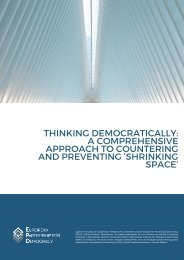Repression and resilience: Diagnosing closing space mid-pandemic
You also want an ePaper? Increase the reach of your titles
YUMPU automatically turns print PDFs into web optimized ePapers that Google loves.
18 REPRESSION AND RESILIENCE: DIAGNOSING CLOSING SPACE MID-PANDEMIC<br />
Price gouging has been particularly damaging for public<br />
bodies acquiring personal protective equipment against<br />
COVID-19: several governments purchased masks at 25<br />
times the original price 41 , while the World Bank estimated<br />
that prices have gone up 2,000% for some items. 42 The<br />
WHO reported that the price of N95 respirators have<br />
trebled <strong>and</strong> that of medical gowns have doubled, 43 at<br />
the expense of the health of frontline personnel <strong>and</strong><br />
vulnerable citizens.<br />
The case studies similarly saw an abuse <strong>and</strong><br />
mismanagement of state <strong>and</strong> external p<strong>and</strong>emic<br />
resources, for the benefit of elites <strong>and</strong> at the expense<br />
of public health. In Kenya <strong>and</strong> El Salvador in particular,<br />
major irregularities were seen in public procurement<br />
to counter the health <strong>and</strong> food crisis. In both cases,<br />
investigative journalists were the strongest oversight<br />
actors, scrutinising public information <strong>and</strong> uncovering<br />
major irregularities <strong>and</strong> corruption cases.<br />
In addition to the mismanagement of funds, most<br />
governments studied in the country cases became less<br />
transparent. This ranges from the failure to proactively<br />
publicise relevant information, to a lack of public<br />
consultation for the adoption of new laws. In Indonesia,<br />
a Mineral <strong>and</strong> Coal Mining Law was passed without any<br />
stakeholder consultation, completely bypassing civil<br />
society. In contrast, Honduras saw a government effort to<br />
increase transparency at the time of the p<strong>and</strong>emic, with<br />
a new regulation to establish transparency institutions<br />
<strong>and</strong> digital administration. Yet this same country was<br />
also marred by irregularities in the purchasing of health<br />
equipment, with audits showing criminal elites were<br />
involved in the purchasing <strong>and</strong> contracts for hospital<br />
mobiles <strong>and</strong> beds.<br />
Rights of women <strong>and</strong> disadvantaged<br />
people<br />
An investigative report in Kenya dubbed “COVID-19<br />
millionaires” revealed how connected companies <strong>and</strong><br />
individuals made billions of Kenyan Shillings from<br />
COVID-19 funds through dubious tendering processes<br />
for medical products. 44 The discovery of the corruption<br />
left Kenyans outraged <strong>and</strong> led citizens to pressure the<br />
government on social media on an unprecedented scale.<br />
The media investigations <strong>and</strong> social media protests were<br />
met with some success, leading to proper investigations<br />
by an anti-corruption commission <strong>and</strong> suspensions in the<br />
health ministry. The mismanagement of p<strong>and</strong>emic funds<br />
awakened a sense of injustice <strong>and</strong> led to more vigorous<br />
calls for greater democracy from Kenyan citizens.<br />
As the p<strong>and</strong>emic reinforced existing trends, women <strong>and</strong><br />
disadvantaged communities were most affected by the<br />
p<strong>and</strong>emic itself <strong>and</strong> by the measures that came with it. A<br />
major increase in domestic <strong>and</strong> gender-based violence<br />
was observed around the world, 45 as exemplified by<br />
the worrying increase in the number of calls recorded<br />
by national women’s helplines worldwide after the<br />
introduction of lockdown measures. 46 This global trend<br />
was reflected in the case studies. 47 In Colombia, the<br />
number of phone calls to report domestic violence<br />
episodes across the country increased 142% during<br />
the first three weeks of confinement. A similar increase<br />
in domestic violence occurred in Guatemala, where<br />
the Presidential Secretariat for Women was closed<br />
41 Transparency International (2020): First Response: Procure Medical Supplies at Any Cost (<strong>and</strong> Risk). Available here.<br />
42 The Economist Intelligence Unit (2020): The future of public spending: Responses to COVID-19. Available here.<br />
43 WHO (2020): “News release: Shortage of personal protective equipment endangering health workers worldwide”. Available here.<br />
44 BBC News (24 September 2020): “Coronavirus corruption in Kenya: Officials <strong>and</strong> businesspeople targeted”. Accessed on 26/03/2021,<br />
available here.<br />
45 Amnesty International (2021): Amnesty International Report 2020/21: The state of the world’s human rights. Available here.<br />
46 UNODC (2020): Research brief: What crime <strong>and</strong> helpline data say about the impact of the COVID-19 p<strong>and</strong>emic on reported violence<br />
against women <strong>and</strong> girls. Available here.<br />
47 Particularly in Honduras, El Salvador <strong>and</strong> Colombia.

















